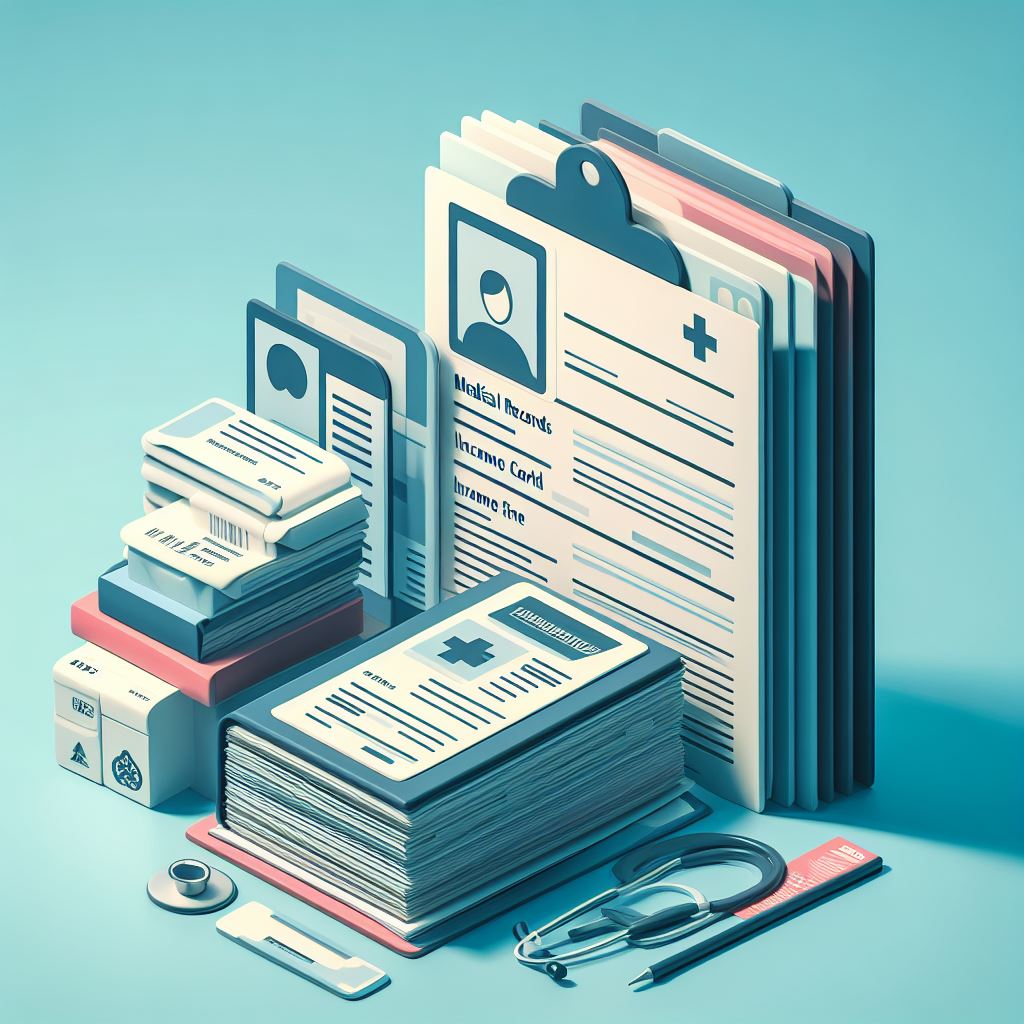Essential Paperwork for Health Insurance Applications

Looking to secure health insurance? Before you dive into the application process, make sure you have all the essential paperwork in order.
From proof of identity and residency to income verification and medical records, having these documents on hand will save you time and ensure a smooth application experience.
So, grab your pen and get ready to gather the necessary paperwork that will help you get the health insurance coverage you need.
Key Takeaways
- Proof of Identity and Residency: Valid passport, driver’s license, government-issued identification card, utility bill, and bank statement are essential documents for health insurance applications.
- Income Verification Documents: Pay stubs, tax returns, W-2 forms, bank statements, and proof of additional income are necessary to verify income for health insurance applications.
- Existing Health Coverage Details: Insurance cards, policy documents, correspondence from the insurance provider, type of coverage, deductibles, and copayments should be provided to understand existing health coverage.
- Medical History and Prescription Records: Accurate understanding of health background, prescription records for medication needs, details about past treatments, surgeries, hospitalizations, and insights into chronic or recurring health conditions are crucial for health insurance applications.
Proof of Identity and Residency
To provide proof of identity and residency, you’ll need to submit certain documents when applying for health insurance. These documents are necessary to verify your identity and ensure that you’re a resident of the country where you’re applying for health coverage.
The specific documents required may vary depending on your state or country, but common documents include a valid passport, driver’s license, or government-issued identification card. These documents should clearly display your full name, date of birth, and a photograph of yourself.
Additionally, you may be asked to provide proof of residency, such as a utility bill, bank statement, or lease agreement that shows your current address. It’s important to note that these documents must be valid and not expired.
Providing accurate and up-to-date proof of identity and residency is crucial for the health insurance application process. Failure to submit the required documents may result in a delay or denial of your application. Therefore, it’s essential to carefully review the requirements and ensure that you have all the necessary documents before applying for health insurance.
Income Verification Documents
You will need to provide income verification documents when applying for health insurance. These documents are necessary to verify your income and determine your eligibility for financial assistance or subsidies. The specific documents required may vary depending on the insurance provider and the type of coverage you’re applying for. However, some common income verification documents include pay stubs, tax returns, W-2 forms, and bank statements.
Pay stubs are typically required to provide proof of your current income. They show your earnings, deductions, and taxes withheld. Tax returns are another important document as they provide a comprehensive overview of your income for the previous year. W-2 forms, which are provided by your employer, also offer information about your annual income and taxes paid. Bank statements can be used to verify any additional sources of income, such as interest or dividends.
It is important to gather these documents and ensure they’re up-to-date and accurate before submitting your health insurance application. Incomplete or incorrect income information may result in delays or even denial of coverage. Therefore, it’s crucial to carefully review and double-check all income verification documents to ensure they’re complete and accurate.
Existing Health Coverage Details
Before proceeding with your health insurance application, it’s important to regularly assess and update your existing health coverage details. This step ensures that you have accurate information about your current coverage and can make informed decisions about your future health insurance needs.
Start by gathering all relevant documents that provide details about your current health coverage. This may include insurance cards, policy documents, and any correspondence from your insurance provider. Take the time to review these documents carefully, noting important information such as the type of coverage, deductibles, copayments, and any limitations or exclusions.
Next, assess whether your existing health coverage is still meeting your needs. Consider factors such as changes in your health status, financial situation, or healthcare needs. If you find that your current coverage is no longer sufficient, it may be time to explore other options and make changes to your health insurance plan.
Updating your existing health coverage details is crucial when applying for new health insurance. Providing accurate and up-to-date information ensures that you receive the most appropriate coverage and prevents any delays or complications during the application process.
Medical History and Prescription Records
Gather all your medical history and prescription records. When applying for health insurance, it’s crucial to have this information readily available. Here are four key reasons why:
- Accurate Information: Providing your complete medical history ensures that the insurance company has an accurate understanding of your health background. This helps them assess any pre-existing conditions and determine appropriate coverage options.
- Prescription Records: Your prescription records are essential for insurers to evaluate your medication needs. This information allows them to determine coverage for medications and anticipate any potential costs.
- Treatment History: Your medical history provides details about past treatments, surgeries, and hospitalizations. This helps insurers understand your healthcare needs and make informed decisions about coverage.
- Health Conditions: By sharing your medical history, you give insurers insights into any chronic or recurring health conditions. This information is crucial for determining coverage and ensuring you receive appropriate care and support.
Having your medical history and prescription records ready streamlines the insurance application process. It allows insurers to assess your needs accurately and offer suitable coverage options. Once you have gathered this information, you can proceed to the next step: organizing your social security number and tax information.
Social Security Number and Tax Information
Once you have compiled your medical history and prescription records, it’s time to move on to providing your social security number and tax information. This step is crucial for health insurance applications as it helps verify your identity and determine your eligibility for certain health plans.
When it comes to your social security number, it’s essential to provide accurate and up-to-date information. Double-checking the digits before submitting your application can save you from potential complications down the line. Make sure to keep this information secure and only provide it to trusted sources.
In addition to your social security number, you’ll also need to provide tax information. This typically includes your annual income, tax filing status, and any dependents you claim. This information helps insurance companies assess your financial situation and determine your eligibility for certain subsidies or tax credits.
To ensure that your tax information is accurate, refer to your most recent tax returns or consult with a tax professional. Providing precise and verifiable tax information will help streamline the application process and ensure that you receive the appropriate coverage and benefits.
Frequently Asked Questions
What Happens if I Don’t Have Any Existing Health Coverage Details to Provide?
If you don’t have any existing health coverage details to provide, you may need to provide additional information or documents to prove your eligibility for health insurance. Contact the insurance provider for specific requirements.
Can I Provide a Copy of My Passport as Proof of Identity and Residency?
Yes, you can provide a copy of your passport as proof of identity and residency. It is a valid form of documentation that is commonly accepted for health insurance applications.
What Types of Income Verification Documents Are Generally Accepted for Health Insurance Applications?
To verify your income for health insurance applications, generally accepted documents include pay stubs, tax returns, bank statements, and W-2 forms. These documents help determine if you qualify for financial assistance or subsidies.
Do I Need to Provide Medical History and Prescription Records for Every Member of My Family?
You don’t have to provide medical history and prescription records for every family member. Only the necessary paperwork is needed. It’s important to focus on what’s required to streamline the application process.
Is My Social Security Number Required for Every Health Insurance Application?
Yes, your social security number is typically required for every health insurance application. It helps verify your identity and ensure accurate processing of your application.



